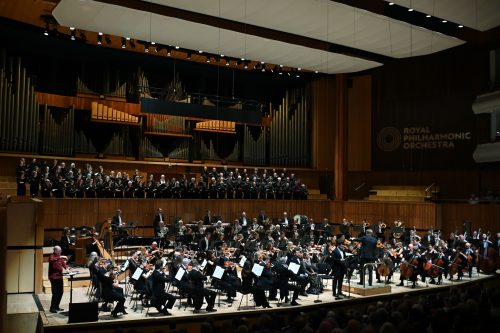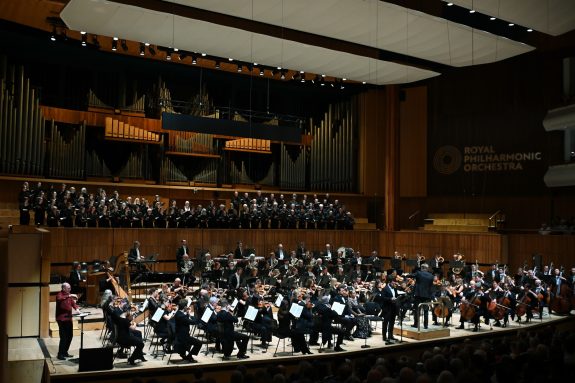 United Kingdom Elgar, Weinberg, Rachmaninov: Sheku Kanneh-Mason (cello), Mirjam Mesak (soprano), Pavel Petrov (tenor), Andrii Kymach (baritone), Paul Whittaker (BSL performer), Philharmonia Chorus, Royal Philharmonic Orchestra / Vasily Petrenko (conductor). Royal Festival Hall, London, 11.4.2024. (CK)
United Kingdom Elgar, Weinberg, Rachmaninov: Sheku Kanneh-Mason (cello), Mirjam Mesak (soprano), Pavel Petrov (tenor), Andrii Kymach (baritone), Paul Whittaker (BSL performer), Philharmonia Chorus, Royal Philharmonic Orchestra / Vasily Petrenko (conductor). Royal Festival Hall, London, 11.4.2024. (CK)

Elgar – In the South (Alassio)
Mieczyslaw Weinberg – Cello Concerto
Rachmaninov – The Bells
Not yet fully recovered from the China Shenzhen Symphony Orchestra’s thrilling performance of Respighi’s Pines of Rome in The Anvil, Basingstoke (review by Marc Bridle here), I was looking forward to Elgar’s musical postcard from Italy: for most of my life I have blown hot and cold about Elgar’s music, but I have loved In the South since Silvestri’s recording with the Bournemouth Symphony Orchestra appeared in the late ‘60s.
Alas, this performance from a team of proven excellence was not in that league: the opening failed to sweep us off our feet as it should, and though the Elgarian elan put in an occasional appearance Vasily Petrenko seemed determined to take the reflective episodes (the clarinet’s Moglio tune the first of them) as slowly as possible, so that the music became becalmed. During the viola’s canto popolare – atmospherically played by Abigail Fenna – the principal clarinet took the opportunity to do some instrumental repair work: not the kind of thing one would notice if the music was properly casting its spell. It was beautifully played; but it failed to fire.
Mieczyslaw Weinberg’s Cello Concerto was a different matter. I have to confess that this was my first live experience of the music of this composer – in 1939 he was a 20-year-old on the run from the Nazis who interned and murdered his family – and who only now is emerging from the shadow of Shostakovich. I feel privileged that my introduction to Weinberg was in the hands of Sheku Kanneh-Mason. His performance was spellbinding from the start, playing with hauntingly veiled tone against the quiet pulse and throb of the strings, eventually breaking into anguished declamation. The link with Shostakovich was abundantly clear, though it never clouded the sense that we were listening to a personal and original voice: this was partly due to the huge integrity of Kanneh-Mason’s playing, his plain utterance never over-sweetened by too much vibrato, and the attractively woody, slightly furry tone he coaxed from his 1700 cello.
The second movement, Moderato, began with – of all things – a Habanera on plucked violas and cellos; here, and in the stern moto perpetuo that opened the ensuing Allegro, there was a sense of a Mahlerian gap opening up between the music’s surface and its depths, fraught with tensions. A skirling march – pure Shostakovich; a sarcastic trumpet, an insouciant piccolo; a serene melody on the cello that masks a growing sense of unease. There is anger, fear, even violence in this music; the cello is hard put to it to restore equilibrium in an extended cadenza. Taking the musical line down to a thread of sound, Kanneh-Mason held us spellbound (despite the coughers).
The finale brought more powerful orchestral playing before the cello wound the concerto to a calm conclusion. Consolatory; beatific; exhausted; resigned – all of these, or none? In the uncertainty lies the music’s power. No doubts, though, about Kanneh-Mason’s performance: sensitive, devoted, and ego-free. He was cheered to the rafters, and the orchestra clearly adored him. For his encore he played Weinberg’s Prelude No.18 for solo cello: a moving threnody. I was probably not the only person in the audience wanting to hear him play the other 23.

Rachmaninov’s cantata The Bells after the interval was an unqualified triumph. Petrenko was on home ground here, and he inspired a coruscating performance from the Royal Philharmonic Orchestra, doing full justice to Rachmaninov’s brilliance as an orchestrator and his instinctive sense of drama. The soloists too were superb: the sweet-toned tenor Pavel Petrov found it hard to project his voice over the hubbub in parts of the first movement, but in the second the soprano Mirjam Mesak’s clear, bell-like voice was a joy to hear, opening out thrillingly at the movement’s climax. The fine baritone Andrii Kymach brought appropriately cavernous gloom to the final movement: he had me hoping that Petrenko might engage him for Shostakovich’s Babi Yar.
The real heroes of the evening, though, were the Philharmonia Chorus. Not especially large – around 100 singers – they blew us away with their first entry: precision, attack, and enough volume for Gurrelieder. The quieter moments – their humming over harp, piano and celeste later in the first movement – were magical too. They were fabulous: the combined power of chorus and orchestra at the climaxes was shattering. A gentleman sitting behind me reckoned that no chorus can produce such decibels unless it is stiffened with professional singers: whether or no, enthusiastic plaudits to the Philharmonia Chorus and their Director Gavin Carr. A fine concert; and the conjunction of Russian conductor, Estonian soprano, Belarusian tenor and Ukrainian baritone had me dreaming of a better world.
Chris Kettle
